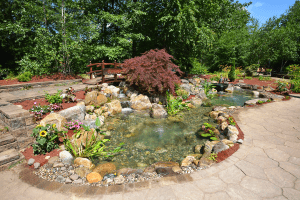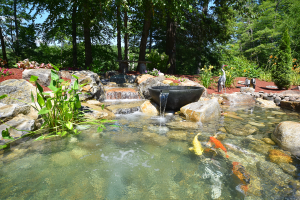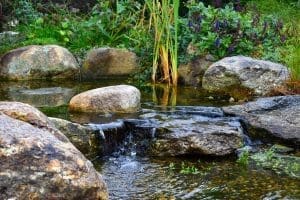Pond owners cherish the sight of their fish feeding energetically in summer. Yet, feeding pond fish requires knowledge to ensure their health and the pond’s ecosystem balance. This guide offers comprehensive tips to help you provide the best care for your aquatic pets during the hot months.
1. Choose High-Quality Fish Food
Feeding your fish premium food is crucial. Look for fish food rich in aquaculture proteins like fish meal, shrimp meal, and squid meal. These ingredients ensure better digestion and overall health for your pond fish.
2. Adhere to the 5-Minute Rule
Feed your fish only what they can consume in about five minutes. Overfeeding leads to excess waste, which can disrupt the pond’s ecosystem. Monitor the amount and adjust as needed to maintain a clean and healthy pond environment.
3. Allow Natural Feeding
Fish can sustain themselves by consuming algae and beneficial bacteria present in the pond. If you’re away, rest assured they will not starve as they can feed on these natural resources, benefiting from the nutrients found in algae.
4. Store Fish Food Properly
Purchase fish food in quantities that last for the season. Store it in a cool, dry place to prevent spoilage. Avoid freezing as it can damage the nutritional value. Discard any food that smells off or shows signs of mold.
5. Offer Summer Snacks
While not essential, offering treats like watermelon, orange slices, peas, or even Cheerios can be a delightful activity. Ensure that these snacks are given in moderation and are appropriate for your fish to avoid any adverse effects.
6. Establish a Feeding Schedule
Consistency is key. Feed your fish at the same times daily to build a routine. This practice not only conditions your fish to expect feeding but also allows you to monitor their health and eating habits closely.
FAQs
1. Can pond fish survive without daily feeding? Yes, pond fish can survive on natural algae and microorganisms in the pond if daily feeding is not possible.
2. How do I know if I am overfeeding my pond fish? If there is leftover food after five minutes, reduce the amount you feed them to avoid overfeeding.
3. Is it safe to feed pond fish human food? Yes, but only certain types like fruits and peas. Avoid processed or sugary foods.
4. What should I do if my fish food smells bad? Discard it immediately. Bad-smelling fish food can be harmful to your fish.
5. How often should I clean my pond if I feed my fish regularly? Regular cleaning depends on your pond’s size and stocking density, but generally, every few weeks is advisable to maintain water quality.
By following these tips, you can ensure a healthy and enjoyable summer for your pond fish, creating a vibrant aquatic environment that you and your family will love.




